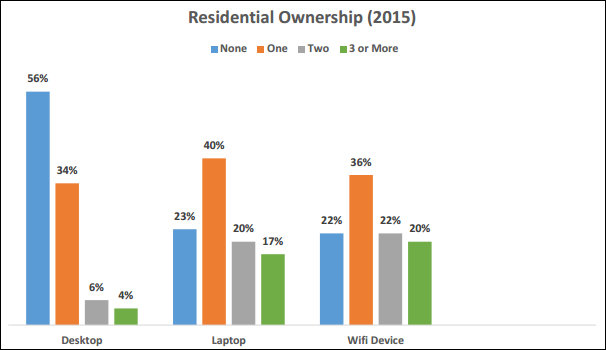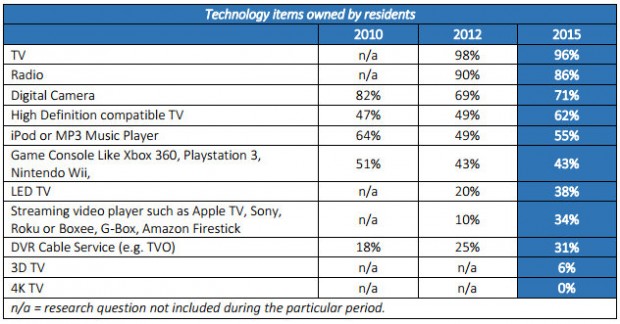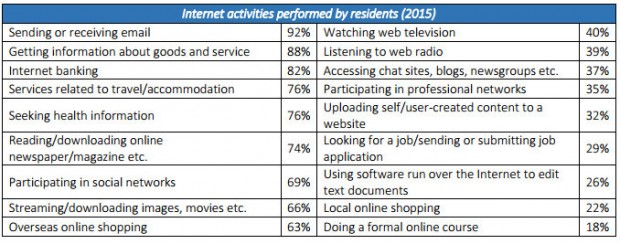2014/15 Bermuda Technology Report Released
99% of businesses have internet access, 89% of households have access to the internet, 98% of residents use the internet from any location at least once a week, and 85% of households owned a smartphone.
In addition, 63% of residents shop online with overseas merchants, 22% of residents shop online with local merchants, 60% of businesses have a corporate social networking presence and 78% of residents owned a wifi or Internet ready device, such as a tablet or e-reader.
These statistics are contained in the State of ICT in Bermuda 2014/15 report released today [Sept 16] by the Minister of Economic Development Grant Gibbons, with the report undertaken by the Department of E-Commerce to assess the prevalence of Information Communications Technology [ICT] in Bermuda.
Chart #1 extracted from the report:
“Bermuda is part of the global market and its competitiveness and success are reliant on the Island’s digital infrastructure,” said Minister Gibbons.
“The results of The State of ICT in Bermuda 2014/15 report confirm that despite the current economic challenges, Bermuda residents and Bermuda-based companies continue to acquire technology and use it in most areas of everyday life,” added Minister Gibbons.
Chart #2 extracted from the report:
“The 2014/15 report confirms that technology is a fundamental part of Bermuda life. Its use drives and facilitates much of what is done on a daily basis: at school, at work, and at home,” the Ministry said.
“The State of ICT in Bermuda report informs policy direction, development and programmes. The regular benchmarking has resulted in the Department of E-Commerce maintaining and strengthening programmes such as Cybertips.bm, the Technology Leadership Forum, TechAwards, and TechTalks.
“In addition, the data supports the country’s marketing efforts to attract foreign investment. Since foreign investment decisions are based on the complete package that a jurisdiction has to offer, Bermuda being an “e-ready” domicile is considered an advantage.”
Chart #3 extracted from the report:
“We undertake this research regularly to better capture the reach of technology throughout the different sections of our community. We benchmark the data in order to inform government policies and initiatives,” said Dr. Marisa Stones, Director of E-Commerce.
For the full report, additional information, and sampling details go to the publications page on www.ecommerce.gov.bm, or see below.
The 65-page 2014/15 State of ICT in Bermuda report follows below [PDF here]:
Read More About
Category: All, Business, News, technology






I can guess how this will look it they added average cost of the Technology at the time and house income.
And 100% of us are being overcharged.
63% of Bermudian shop online with overseas merchants and 22% shopping online with local merchants… Course this doesn’t reflect how much people use online shopping over local and I am not against online shopping outright, but buy or at least use local as much as possible, that way we support local employment.
Other than Redlaser, which local merchant caters to online shopping?
Wasn’t looking to advertise anyone in particular, but three others off top of my head are Price Busters, Conspec, Joshua Bates facilitate various degrees of online ordering, and I believe there are a number of other individuals that do as well.
OK, by that definition we would include TCD, the Post Office, Fedex, DHL, Mailboxes, Port Royal Golf Course, Tuckers Point and The Princess hotels. Not really ‘local merchants’ though are they?
TCD would be a local merchant, they are a local entity that you are doing business with online. The Post Office doesn’t facilitate online ordering, they just deliver what you order and charge you per package, same said for FedEx, DHL and Mailboxes. And how Tucker’s Point, PRGC and Princess fits in I am not sure.
By facilitate, I am talking about you providing the local vendor with what it is you want to order they then coordinate the online order and bringing it in, and rather than piecemeal, they would typically consolidate everything together for you overseas and then bring it in together in one shipment, in their own container/s with other items they are shipping in so as to reduce the cost for importation. With your traditional parcel delivery services, you will often find that getting in your orders can sometime cost up to 100 – 150% to land over the original cost, while facilitators can be around 50 – 75%, the trade off would be timing. So check locally first, because while you might find it cheaper online, landing it here doesn’t always make it so.
Bermuda won’t let certain businesses come here from overseas so we shop online. Apparently that’s how we want it and that’s how we like it.
Here’s the crux, how can someone complain about the state of our economy, but also be responsible for excessively bleeding it. There are something’s we just can’t find locally readily, but that list has diminished quite a bit.
60% of local businesses have an online presence? Still seems somewhat low in this day and age. Is it (still?) cost or time prohibitive to create a basic website and or FB page?
I think the report shows there’s quite a lot of potential for local retail e-commerce, as well as the importance of getting more local businesses online too. As PBanks notes, one could easily set up at least a FB page.
Bermuda is way behind in the Internet speeds, and with very high prices. 25 MB/s is not fast, and in Bermuda it’s the fastest available for home consumers, and the cost is ridiculous. Everything in Bermuda is ridiculously priced. The same loaf of bread in Bermuda which costs $4.99 I saw in the US for 99cents. That’s a 500% markup. For the price I pay for 15MB/s internet speed I should be getting 100MB/s.
You are absolutely correct. The high cost of everything in this island lowers the quality of life for everyone.
You seem to think we can be compared to the U.S. market in some sort of equivilance. It may cost about 99 cents for a loaf of bread in the U.S. but is also going to cost about $3 to ship it here. Parralleling that to our tech base, the U.S. has a huge market value, a service provider looking to sell a service in a city has millions of potential customers in a condensed area, so infrastructure is less as you run a single cable to one building and you can possibly feed hundreds of clients, meaning the ROI on the cost of equipment they need to provide that service will have a quicker turn around; in Bermuda we are only a market of around 60,000, spaced out in a more rural distribution, so the infrastructure cost is higher, and purchasing the equipment for the service is more expensive than in the U.S. Thus, the ROI is longer and if you over invest, then by the time it comes to upgrading or replacing the equipment and you haven’t achieved a ROI, then you are out of pocket.
25 Mbps is more than adequate for any household (I can’t speak to the cost).
There is also a big difference between having an “online presence” and implementing a website complete with an ordering catalog that includes current inventory availability and is secure enough such that customer information is not hacked and stolen.